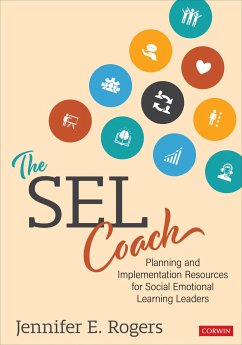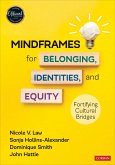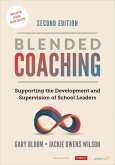Jennifer E Rogers
The Sel Coach
Planning and Implementation Resources for Social Emotional Learning Leaders
24,99 €
inkl. MwSt.
Versandfertig in 6-10 Tagen

12 °P sammeln
Jennifer E Rogers
The Sel Coach
Planning and Implementation Resources for Social Emotional Learning Leaders
- Broschiertes Buch
- Merkliste
- Auf die Merkliste
- Bewerten Bewerten
- Teilen
- Produkt teilen
- Produkterinnerung
- Produkterinnerung
Your guide to transforming SEL ideas into actions and practice into process
While social-emotional learning (SEL) is regularly identified as a top priority for student well-being and achievement, effective implementation will not happen on its own. That s what makes the SEL coach critical to success.
Effective systems change happens with an SEL coach who has the skills to lead, communicate, analyze, train, collaborate, and innovate. Whether you are brand new to the position or have been an SEL coach for some time, this book will provide you with all the resources and ideas you need to…mehr
Andere Kunden interessierten sich auch für
![Mindframes for Belonging, Identities, and Equity Mindframes for Belonging, Identities, and Equity]() Nicole V. LawMindframes for Belonging, Identities, and Equity25,99 €
Nicole V. LawMindframes for Belonging, Identities, and Equity25,99 €![Blended Coaching Blended Coaching]() Gary S. BloomBlended Coaching28,99 €
Gary S. BloomBlended Coaching28,99 €![Civic Engagement in Diverse Latinx Communities Civic Engagement in Diverse Latinx Communities]() Mari CastañedaCivic Engagement in Diverse Latinx Communities103,70 €
Mari CastañedaCivic Engagement in Diverse Latinx Communities103,70 €![Civic Engagement in Diverse Latinx Communities Civic Engagement in Diverse Latinx Communities]() Mari CastañedaCivic Engagement in Diverse Latinx Communities57,90 €
Mari CastañedaCivic Engagement in Diverse Latinx Communities57,90 €![Thinking and the Sense of Life Thinking and the Sense of Life]() Gerhard SchaeferThinking and the Sense of Life31,80 €
Gerhard SchaeferThinking and the Sense of Life31,80 €![Quality of Life in Cross-Modal Perspectives of Inclusive Education Quality of Life in Cross-Modal Perspectives of Inclusive Education]() Quality of Life in Cross-Modal Perspectives of Inclusive Education34,95 €
Quality of Life in Cross-Modal Perspectives of Inclusive Education34,95 €![Nurturing the wellbeing of students in difficulty Nurturing the wellbeing of students in difficulty]() Nurturing the wellbeing of students in difficulty52,95 €
Nurturing the wellbeing of students in difficulty52,95 €-
-
-
Your guide to transforming SEL ideas into actions and practice into process
While social-emotional learning (SEL) is regularly identified as a top priority for student well-being and achievement, effective implementation will not happen on its own. That s what makes the SEL coach critical to success.
Effective systems change happens with an SEL coach who has the skills to lead, communicate, analyze, train, collaborate, and innovate. Whether you are brand new to the position or have been an SEL coach for some time, this book will provide you with all the resources and ideas you need to take implementation to the next level. Jennifer Rogers shares the secrets to enriching your coaching skillset, including
Data Collection strategic monitoring of the implementation progress Training engaging staff in learning and advocating for their needs Communication listening actively, modeling, and summarizing Team-Leading creating an environment that is supportive and goal-focused
The lessons and examples in this book produce coaching competencies and qualities necessary to transform practices into processes, ideas into action plans, and goals into outcomes. Learn how to be a successful SEL implementor with this strategy-packed guidebook!
While social-emotional learning (SEL) is regularly identified as a top priority for student well-being and achievement, effective implementation will not happen on its own. That s what makes the SEL coach critical to success.
Effective systems change happens with an SEL coach who has the skills to lead, communicate, analyze, train, collaborate, and innovate. Whether you are brand new to the position or have been an SEL coach for some time, this book will provide you with all the resources and ideas you need to take implementation to the next level. Jennifer Rogers shares the secrets to enriching your coaching skillset, including
Data Collection strategic monitoring of the implementation progress Training engaging staff in learning and advocating for their needs Communication listening actively, modeling, and summarizing Team-Leading creating an environment that is supportive and goal-focused
The lessons and examples in this book produce coaching competencies and qualities necessary to transform practices into processes, ideas into action plans, and goals into outcomes. Learn how to be a successful SEL implementor with this strategy-packed guidebook!
Produktdetails
- Produktdetails
- Verlag: Corwin / Sage Publications
- Seitenzahl: 232
- Erscheinungstermin: 8. August 2022
- Englisch
- Abmessung: 179mm x 254mm x 18mm
- Gewicht: 631g
- ISBN-13: 9781071870914
- ISBN-10: 1071870912
- Artikelnr.: 63365496
- Herstellerkennzeichnung
- Libri GmbH
- Europaallee 1
- 36244 Bad Hersfeld
- gpsr@libri.de
- Verlag: Corwin / Sage Publications
- Seitenzahl: 232
- Erscheinungstermin: 8. August 2022
- Englisch
- Abmessung: 179mm x 254mm x 18mm
- Gewicht: 631g
- ISBN-13: 9781071870914
- ISBN-10: 1071870912
- Artikelnr.: 63365496
- Herstellerkennzeichnung
- Libri GmbH
- Europaallee 1
- 36244 Bad Hersfeld
- gpsr@libri.de
Dr. Jennifer Rogers is the Founder of Rogers Training Solutions, LLC. She works with educational stakeholders on developing tools and strategies to increase positive student outcomes. Rogers Training Solutions, LLC provides consulting, professional development, workshops, coaching, one-on-one leadership support for individuals and organizations exploring social, emotional, and behavioral interventions in school environments. Dr. Rogers's background has reflected a strong commitment to children and adolescents and their families for over 20 years. She is proud to work side-by-side with educators in promoting social and emotional competencies for all students. She has worked with school districts across the country as a school counselor, researcher, district administrator, coach trainer, and consultant. Schools benefit from her experience as a licensed professional counselor (LPC) and training as a counselor educator to create programs to meet the social, emotional, and behavioral needs for students. She has experience with implementing and measuring the impact of interventions in counseling, prevention, and early intervention. She has advocated for, written about, researched, trained, created interventions for, used data to support, worked with curriculum, and implemented district-wide Social Emotional Learning. Her book, Leading for Change Through Whole-School Social Emotional Learning: Strategies to Build a Positive School Culture (2019) has been adopted by educators and is currently being used in multiple districts. She trains educators in best practices to meet the needs of their specific culture and students. Dr. Rogers professional goals align with the core mission to make social and emotional learning an integral part of education for all students. To reach the goal, her belief is that we must work to support the educators through systemic change and create a common understanding amongst all stakeholders of the benefits of social emotional learning to positive school culture.
PREFACE: To Superintendents, District and Building Administrators
PREFACE: To the SEL Coach
Chapter 1: The Social Emotional Learning Coaching Rule
SEL Coach Roles and Responsibilities
Definition of roles
SEL Coaching Competencies
Change Agent Mindset
Previous experience/looking forward
Chapter 2: Integrating a SEL Coach in your system
Another coach? Why a SEL coach?
Collaboration with other roles in your system
What if SEL coach is not your only role?
The Important Relationship between SEL Coach and Administration
The SEL coach is the navigator
Chapter 3: Getting the system ready for Social Emotional Learning
Foundational Learning of Social Emotional Learning
Systemic Implementation of SEL
Framework for SEL Coaches: Practice and Process
The Issue of Sustainability
Focus on equity
Conduct a needs assessment
An Action Plan for Systemic Clarity
Chapter 4: Advance Your Practice: Leader/Facilitator
Phase 1: Learn about the District Vision
Phase 1: School Readiness- Working with Administrators
Phase 1: Positive School Culture through Positive Relationships
Phase 1: Understanding Beliefs
Phase 1: Know What Your People Know about SEL
Phase 1: Inventory the programs and initiatives
Phase 1: Organizational Capacity: Practices and Processes
Phase 2: Focus on Importance of Prevention
Phase 2: Making Prevention Compelling
Phase 2: Choosing programs and interventions
Phase 2: Promote student engagement
Phase 3: Braid your current interventions to determine gaps
Phase 3: The Process for Accessing Targeted Interventions
Phase 3: Enhance student voice through youth advisory board
Phase 3: Creating an intervention matrix
Phase 4: Year at a Glance
Phase 4: Creating a Universal Intervention manual
Phase 4: Organize materials for ease of use
Chapter 5: Advance your practice: Creating Teams that Work
Phase 1: Developing a team
Phase 1: SEL Team Roles
Phase 1: General shared commitments
Phase 1: Norms for practice
Phase 1: Agendas that work
Phase 1: SEL team meeting minutes
Phase 1: Introducing the team
Phase 2: Consensus practices
Phase 2: The Feedback Flow- Between the coach and team
Phase 2: Motivating a team
Phase 2: Maintaining SEL team
Phase 2: Recruit and train new members of the team
Phase 3: Team Data Analysis
Phase 3: Attuning to your SEL team
Phase 4: Check in6
Chapter 6: Advance your practice: Data support
Phase 1: Qualitative vs. quantitative data
Phase 1: Historical Data: Understand historical data
Phase 1: Climate/Culture Data
Phase 2: Create SMART goals
Phase 2: Create "In the Moment" Data Collection
Phase 2: When choosing an assessment- Universal Screener
Phase 3: Problem solving action plan
Phase 3: Progress Monitoring with a Tiered Fidelity Inventory
Phase 4: Learning more about strategies used by individual teachers
Phase 4: Understanding Evaluation outcomes
Chapter 7: Advance your practice: Professional Development
Phase 1: Universal Social Emotional Learning
Phase 1: How to build educator capacity
Phase 1: Preparing for Professional Development
Phase 1: Intervention practices as described by teachers
Phase 1: Delivering Professional Development
Phase 2: Choosing interventions
Phase 2: Scaffolding trainings for interventions by role
Phase 2: Enhancing classroom procedures after professional development
Phase 3: Self-reflection on professional development
Phase 3: Learn from other's experiences through an exit ticket
Phase 3: Efficacy and fidelity of coaching role
Phase 4: Training Others
Phase 4: A Scope and Sequence Document
Phase 4: Determine who will do what in Universal Implementation
Chapter 8: Advance your practice: Coaching
Phase 1: Clarity for the Coaching Role
Phase 1: Getting Administration Feedback on Coaching
Phase 1: A letter to introduce the coach role with teacher
Phase 1: Introductions Matter- Working with stakeholders
Phase 1: Observations: What is the precedence?
Phase 1: Assess Your Adult SEL
Phase 2: What can the SEL coach do to support staff through coaching?
Phase 2: How can the SEL Coach work with educational stakeholders?
Phase 2: When coaching?
Phase 3: Building Collaborative Relationships through Empowerment
Phase 3: Non-evaluative feedback through observation
Phase 3: Ownership of SEL implementation
Phase 3: Adult SEL: How to build teacher capacity
Phase 4: Maintaining confidentiality in coaching conversations
Phase 4: Working through resistance
Phase 4: Support request form
Phase 4: Monitor the effectiveness of the SEL Coach
Chapter 9: Advance your practice: Communicator
Phase 1: Areas of communication
Phase 1: Collaboration: With Whom Have You Collaborated
Phase 1: Levels of communication
Phase 1: Selling SEL- Coaches version
Phase 1: Yearly report
Phase 2: Engaging Parents/Families in the work
Phase 2: A Parent/Family Network: Education Through Parent Workshops
Phase 3: Parent/Guardian Workshop
Phase 3: Parent/Family Feedback
Phase 4: Investing in Community Stakeholders
Phase 4: Advocating for building your infrastructure
Chapter 10: Support for SEL coaches
Create a personal mission statement
Types of support
Get Feedback from Principals
Prioritizing coaching support checklist for administrators
Creating boundaries around the work
Personal plan-The Oxygen Mask
Shield exercise
The importance of self-care
Check in on yourself
Creating supportive relationships
References
PREFACE: To the SEL Coach
Chapter 1: The Social Emotional Learning Coaching Rule
SEL Coach Roles and Responsibilities
Definition of roles
SEL Coaching Competencies
Change Agent Mindset
Previous experience/looking forward
Chapter 2: Integrating a SEL Coach in your system
Another coach? Why a SEL coach?
Collaboration with other roles in your system
What if SEL coach is not your only role?
The Important Relationship between SEL Coach and Administration
The SEL coach is the navigator
Chapter 3: Getting the system ready for Social Emotional Learning
Foundational Learning of Social Emotional Learning
Systemic Implementation of SEL
Framework for SEL Coaches: Practice and Process
The Issue of Sustainability
Focus on equity
Conduct a needs assessment
An Action Plan for Systemic Clarity
Chapter 4: Advance Your Practice: Leader/Facilitator
Phase 1: Learn about the District Vision
Phase 1: School Readiness- Working with Administrators
Phase 1: Positive School Culture through Positive Relationships
Phase 1: Understanding Beliefs
Phase 1: Know What Your People Know about SEL
Phase 1: Inventory the programs and initiatives
Phase 1: Organizational Capacity: Practices and Processes
Phase 2: Focus on Importance of Prevention
Phase 2: Making Prevention Compelling
Phase 2: Choosing programs and interventions
Phase 2: Promote student engagement
Phase 3: Braid your current interventions to determine gaps
Phase 3: The Process for Accessing Targeted Interventions
Phase 3: Enhance student voice through youth advisory board
Phase 3: Creating an intervention matrix
Phase 4: Year at a Glance
Phase 4: Creating a Universal Intervention manual
Phase 4: Organize materials for ease of use
Chapter 5: Advance your practice: Creating Teams that Work
Phase 1: Developing a team
Phase 1: SEL Team Roles
Phase 1: General shared commitments
Phase 1: Norms for practice
Phase 1: Agendas that work
Phase 1: SEL team meeting minutes
Phase 1: Introducing the team
Phase 2: Consensus practices
Phase 2: The Feedback Flow- Between the coach and team
Phase 2: Motivating a team
Phase 2: Maintaining SEL team
Phase 2: Recruit and train new members of the team
Phase 3: Team Data Analysis
Phase 3: Attuning to your SEL team
Phase 4: Check in6
Chapter 6: Advance your practice: Data support
Phase 1: Qualitative vs. quantitative data
Phase 1: Historical Data: Understand historical data
Phase 1: Climate/Culture Data
Phase 2: Create SMART goals
Phase 2: Create "In the Moment" Data Collection
Phase 2: When choosing an assessment- Universal Screener
Phase 3: Problem solving action plan
Phase 3: Progress Monitoring with a Tiered Fidelity Inventory
Phase 4: Learning more about strategies used by individual teachers
Phase 4: Understanding Evaluation outcomes
Chapter 7: Advance your practice: Professional Development
Phase 1: Universal Social Emotional Learning
Phase 1: How to build educator capacity
Phase 1: Preparing for Professional Development
Phase 1: Intervention practices as described by teachers
Phase 1: Delivering Professional Development
Phase 2: Choosing interventions
Phase 2: Scaffolding trainings for interventions by role
Phase 2: Enhancing classroom procedures after professional development
Phase 3: Self-reflection on professional development
Phase 3: Learn from other's experiences through an exit ticket
Phase 3: Efficacy and fidelity of coaching role
Phase 4: Training Others
Phase 4: A Scope and Sequence Document
Phase 4: Determine who will do what in Universal Implementation
Chapter 8: Advance your practice: Coaching
Phase 1: Clarity for the Coaching Role
Phase 1: Getting Administration Feedback on Coaching
Phase 1: A letter to introduce the coach role with teacher
Phase 1: Introductions Matter- Working with stakeholders
Phase 1: Observations: What is the precedence?
Phase 1: Assess Your Adult SEL
Phase 2: What can the SEL coach do to support staff through coaching?
Phase 2: How can the SEL Coach work with educational stakeholders?
Phase 2: When coaching?
Phase 3: Building Collaborative Relationships through Empowerment
Phase 3: Non-evaluative feedback through observation
Phase 3: Ownership of SEL implementation
Phase 3: Adult SEL: How to build teacher capacity
Phase 4: Maintaining confidentiality in coaching conversations
Phase 4: Working through resistance
Phase 4: Support request form
Phase 4: Monitor the effectiveness of the SEL Coach
Chapter 9: Advance your practice: Communicator
Phase 1: Areas of communication
Phase 1: Collaboration: With Whom Have You Collaborated
Phase 1: Levels of communication
Phase 1: Selling SEL- Coaches version
Phase 1: Yearly report
Phase 2: Engaging Parents/Families in the work
Phase 2: A Parent/Family Network: Education Through Parent Workshops
Phase 3: Parent/Guardian Workshop
Phase 3: Parent/Family Feedback
Phase 4: Investing in Community Stakeholders
Phase 4: Advocating for building your infrastructure
Chapter 10: Support for SEL coaches
Create a personal mission statement
Types of support
Get Feedback from Principals
Prioritizing coaching support checklist for administrators
Creating boundaries around the work
Personal plan-The Oxygen Mask
Shield exercise
The importance of self-care
Check in on yourself
Creating supportive relationships
References
PREFACE: To Superintendents, District and Building Administrators
PREFACE: To the SEL Coach
Chapter 1: The Social Emotional Learning Coaching Rule
SEL Coach Roles and Responsibilities
Definition of roles
SEL Coaching Competencies
Change Agent Mindset
Previous experience/looking forward
Chapter 2: Integrating a SEL Coach in your system
Another coach? Why a SEL coach?
Collaboration with other roles in your system
What if SEL coach is not your only role?
The Important Relationship between SEL Coach and Administration
The SEL coach is the navigator
Chapter 3: Getting the system ready for Social Emotional Learning
Foundational Learning of Social Emotional Learning
Systemic Implementation of SEL
Framework for SEL Coaches: Practice and Process
The Issue of Sustainability
Focus on equity
Conduct a needs assessment
An Action Plan for Systemic Clarity
Chapter 4: Advance Your Practice: Leader/Facilitator
Phase 1: Learn about the District Vision
Phase 1: School Readiness- Working with Administrators
Phase 1: Positive School Culture through Positive Relationships
Phase 1: Understanding Beliefs
Phase 1: Know What Your People Know about SEL
Phase 1: Inventory the programs and initiatives
Phase 1: Organizational Capacity: Practices and Processes
Phase 2: Focus on Importance of Prevention
Phase 2: Making Prevention Compelling
Phase 2: Choosing programs and interventions
Phase 2: Promote student engagement
Phase 3: Braid your current interventions to determine gaps
Phase 3: The Process for Accessing Targeted Interventions
Phase 3: Enhance student voice through youth advisory board
Phase 3: Creating an intervention matrix
Phase 4: Year at a Glance
Phase 4: Creating a Universal Intervention manual
Phase 4: Organize materials for ease of use
Chapter 5: Advance your practice: Creating Teams that Work
Phase 1: Developing a team
Phase 1: SEL Team Roles
Phase 1: General shared commitments
Phase 1: Norms for practice
Phase 1: Agendas that work
Phase 1: SEL team meeting minutes
Phase 1: Introducing the team
Phase 2: Consensus practices
Phase 2: The Feedback Flow- Between the coach and team
Phase 2: Motivating a team
Phase 2: Maintaining SEL team
Phase 2: Recruit and train new members of the team
Phase 3: Team Data Analysis
Phase 3: Attuning to your SEL team
Phase 4: Check in6
Chapter 6: Advance your practice: Data support
Phase 1: Qualitative vs. quantitative data
Phase 1: Historical Data: Understand historical data
Phase 1: Climate/Culture Data
Phase 2: Create SMART goals
Phase 2: Create "In the Moment" Data Collection
Phase 2: When choosing an assessment- Universal Screener
Phase 3: Problem solving action plan
Phase 3: Progress Monitoring with a Tiered Fidelity Inventory
Phase 4: Learning more about strategies used by individual teachers
Phase 4: Understanding Evaluation outcomes
Chapter 7: Advance your practice: Professional Development
Phase 1: Universal Social Emotional Learning
Phase 1: How to build educator capacity
Phase 1: Preparing for Professional Development
Phase 1: Intervention practices as described by teachers
Phase 1: Delivering Professional Development
Phase 2: Choosing interventions
Phase 2: Scaffolding trainings for interventions by role
Phase 2: Enhancing classroom procedures after professional development
Phase 3: Self-reflection on professional development
Phase 3: Learn from other's experiences through an exit ticket
Phase 3: Efficacy and fidelity of coaching role
Phase 4: Training Others
Phase 4: A Scope and Sequence Document
Phase 4: Determine who will do what in Universal Implementation
Chapter 8: Advance your practice: Coaching
Phase 1: Clarity for the Coaching Role
Phase 1: Getting Administration Feedback on Coaching
Phase 1: A letter to introduce the coach role with teacher
Phase 1: Introductions Matter- Working with stakeholders
Phase 1: Observations: What is the precedence?
Phase 1: Assess Your Adult SEL
Phase 2: What can the SEL coach do to support staff through coaching?
Phase 2: How can the SEL Coach work with educational stakeholders?
Phase 2: When coaching?
Phase 3: Building Collaborative Relationships through Empowerment
Phase 3: Non-evaluative feedback through observation
Phase 3: Ownership of SEL implementation
Phase 3: Adult SEL: How to build teacher capacity
Phase 4: Maintaining confidentiality in coaching conversations
Phase 4: Working through resistance
Phase 4: Support request form
Phase 4: Monitor the effectiveness of the SEL Coach
Chapter 9: Advance your practice: Communicator
Phase 1: Areas of communication
Phase 1: Collaboration: With Whom Have You Collaborated
Phase 1: Levels of communication
Phase 1: Selling SEL- Coaches version
Phase 1: Yearly report
Phase 2: Engaging Parents/Families in the work
Phase 2: A Parent/Family Network: Education Through Parent Workshops
Phase 3: Parent/Guardian Workshop
Phase 3: Parent/Family Feedback
Phase 4: Investing in Community Stakeholders
Phase 4: Advocating for building your infrastructure
Chapter 10: Support for SEL coaches
Create a personal mission statement
Types of support
Get Feedback from Principals
Prioritizing coaching support checklist for administrators
Creating boundaries around the work
Personal plan-The Oxygen Mask
Shield exercise
The importance of self-care
Check in on yourself
Creating supportive relationships
References
PREFACE: To the SEL Coach
Chapter 1: The Social Emotional Learning Coaching Rule
SEL Coach Roles and Responsibilities
Definition of roles
SEL Coaching Competencies
Change Agent Mindset
Previous experience/looking forward
Chapter 2: Integrating a SEL Coach in your system
Another coach? Why a SEL coach?
Collaboration with other roles in your system
What if SEL coach is not your only role?
The Important Relationship between SEL Coach and Administration
The SEL coach is the navigator
Chapter 3: Getting the system ready for Social Emotional Learning
Foundational Learning of Social Emotional Learning
Systemic Implementation of SEL
Framework for SEL Coaches: Practice and Process
The Issue of Sustainability
Focus on equity
Conduct a needs assessment
An Action Plan for Systemic Clarity
Chapter 4: Advance Your Practice: Leader/Facilitator
Phase 1: Learn about the District Vision
Phase 1: School Readiness- Working with Administrators
Phase 1: Positive School Culture through Positive Relationships
Phase 1: Understanding Beliefs
Phase 1: Know What Your People Know about SEL
Phase 1: Inventory the programs and initiatives
Phase 1: Organizational Capacity: Practices and Processes
Phase 2: Focus on Importance of Prevention
Phase 2: Making Prevention Compelling
Phase 2: Choosing programs and interventions
Phase 2: Promote student engagement
Phase 3: Braid your current interventions to determine gaps
Phase 3: The Process for Accessing Targeted Interventions
Phase 3: Enhance student voice through youth advisory board
Phase 3: Creating an intervention matrix
Phase 4: Year at a Glance
Phase 4: Creating a Universal Intervention manual
Phase 4: Organize materials for ease of use
Chapter 5: Advance your practice: Creating Teams that Work
Phase 1: Developing a team
Phase 1: SEL Team Roles
Phase 1: General shared commitments
Phase 1: Norms for practice
Phase 1: Agendas that work
Phase 1: SEL team meeting minutes
Phase 1: Introducing the team
Phase 2: Consensus practices
Phase 2: The Feedback Flow- Between the coach and team
Phase 2: Motivating a team
Phase 2: Maintaining SEL team
Phase 2: Recruit and train new members of the team
Phase 3: Team Data Analysis
Phase 3: Attuning to your SEL team
Phase 4: Check in6
Chapter 6: Advance your practice: Data support
Phase 1: Qualitative vs. quantitative data
Phase 1: Historical Data: Understand historical data
Phase 1: Climate/Culture Data
Phase 2: Create SMART goals
Phase 2: Create "In the Moment" Data Collection
Phase 2: When choosing an assessment- Universal Screener
Phase 3: Problem solving action plan
Phase 3: Progress Monitoring with a Tiered Fidelity Inventory
Phase 4: Learning more about strategies used by individual teachers
Phase 4: Understanding Evaluation outcomes
Chapter 7: Advance your practice: Professional Development
Phase 1: Universal Social Emotional Learning
Phase 1: How to build educator capacity
Phase 1: Preparing for Professional Development
Phase 1: Intervention practices as described by teachers
Phase 1: Delivering Professional Development
Phase 2: Choosing interventions
Phase 2: Scaffolding trainings for interventions by role
Phase 2: Enhancing classroom procedures after professional development
Phase 3: Self-reflection on professional development
Phase 3: Learn from other's experiences through an exit ticket
Phase 3: Efficacy and fidelity of coaching role
Phase 4: Training Others
Phase 4: A Scope and Sequence Document
Phase 4: Determine who will do what in Universal Implementation
Chapter 8: Advance your practice: Coaching
Phase 1: Clarity for the Coaching Role
Phase 1: Getting Administration Feedback on Coaching
Phase 1: A letter to introduce the coach role with teacher
Phase 1: Introductions Matter- Working with stakeholders
Phase 1: Observations: What is the precedence?
Phase 1: Assess Your Adult SEL
Phase 2: What can the SEL coach do to support staff through coaching?
Phase 2: How can the SEL Coach work with educational stakeholders?
Phase 2: When coaching?
Phase 3: Building Collaborative Relationships through Empowerment
Phase 3: Non-evaluative feedback through observation
Phase 3: Ownership of SEL implementation
Phase 3: Adult SEL: How to build teacher capacity
Phase 4: Maintaining confidentiality in coaching conversations
Phase 4: Working through resistance
Phase 4: Support request form
Phase 4: Monitor the effectiveness of the SEL Coach
Chapter 9: Advance your practice: Communicator
Phase 1: Areas of communication
Phase 1: Collaboration: With Whom Have You Collaborated
Phase 1: Levels of communication
Phase 1: Selling SEL- Coaches version
Phase 1: Yearly report
Phase 2: Engaging Parents/Families in the work
Phase 2: A Parent/Family Network: Education Through Parent Workshops
Phase 3: Parent/Guardian Workshop
Phase 3: Parent/Family Feedback
Phase 4: Investing in Community Stakeholders
Phase 4: Advocating for building your infrastructure
Chapter 10: Support for SEL coaches
Create a personal mission statement
Types of support
Get Feedback from Principals
Prioritizing coaching support checklist for administrators
Creating boundaries around the work
Personal plan-The Oxygen Mask
Shield exercise
The importance of self-care
Check in on yourself
Creating supportive relationships
References







